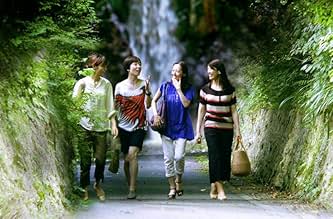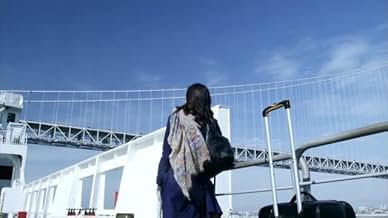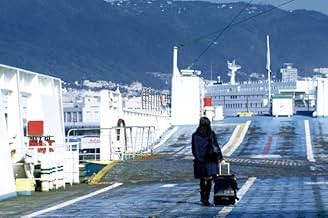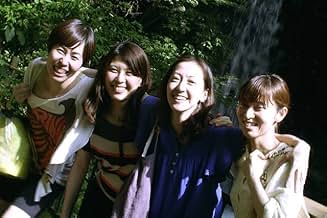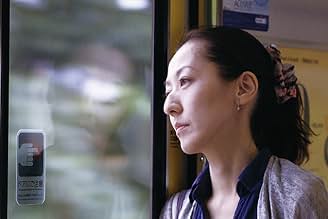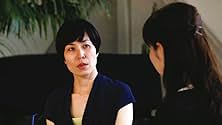IMDb रेटिंग
7.6/10
3.2 हज़ार
आपकी रेटिंग
अपनी भाषा में प्लॉट जोड़ेंA slow-burning epic chronicling the emotional journey of four thirty something women in the misty seaside city of Kobe.A slow-burning epic chronicling the emotional journey of four thirty something women in the misty seaside city of Kobe.A slow-burning epic chronicling the emotional journey of four thirty something women in the misty seaside city of Kobe.
- निर्देशक
- लेखक
- स्टार
- पुरस्कार
- 6 जीत और कुल 5 नामांकन
फ़ीचर्ड समीक्षाएं
If you are willing to dedicate 5 hours of your time to watch Hamaguchi's Happy Hour, what you'll find is a cozy yet mildly depressing film perfect for those lonely, chilly winter nights alone.
The film strives to present themes about marriage, divorce, mid-life, relationships, love, and others in an extremely objective way. The dialogue in the café scene even explicitly states this, also inputting that while you can try to be objective, you are ultimately limited by your own experiences. How do you reach this hyper-realism? For one thing you can practically reduce editing to a minimum. The most stand out result of this is not cutting scenes out to pad out the run time. Even I, a person who loves this trend of extending run time in movies, had to split my viewing into 2-parts. However, this luxury of time gives the pacing a very natural feel; characters evolve very logically while not feeling rushed and long scenes of literally just shots of character's faces lets the audience see character's feelings change (or sometimes lack thereof) while not seeming abrupt at all. Another point is how the characters perform. The very amateurish quality in performance is reminiscent of films like Hong Sangsoo, a Korean director well known worldwide for his amateur style. The delivery of dialogue is very flat and relaxed, with only slight changes in intonation and volume for those extremely "dramatic" scenes. Characters display emotion with only subtle changes in facial expressions, or sometimes if they are sad, the director only presents them in the aftermath with their bloodshot eyes.
On the topic of dialogue, this film does suffer from some expository dialogue, a quality in a lot of French New Wave films that turns me off most of the time. I wish that in the 5-hour run time, Hamaguchi could have found more natural and normal ways of delivering dialogue.
How the film is presented is gorgeous. From watching some Ozu films, shot composition is very Japanese, a lot of intersecting lines into horizons and such. Color selection and camera positioning makes the film seem very disconnected from the characters, again contributing to the omniscient perspective of the film. And Kobe just seems like a pretty place to be. I especially loved the singles where the camera is placed right in front of the camera, like a Deacons/Cohen Brothers film making us intimate with the character while their cold expressions still leave a veil between us.
Overall, I think those who are willing to be active watchers for the 5-hour run time can get something out of watching this film, whether if it's about your marriage or if you happen to agree with these other reviews and find that women are evil (?). I personally thought that the main characters felt trapped by the societal pressures of mid-life (marriage, children, love) and that their actions to break out of those chains were out of their intolerance to be stuck in their societal roles as housewives. But the director's purposeful strategy of "present-how-it-is" kind of gives everyone the right to form and support their own ideals based on this film.
The film strives to present themes about marriage, divorce, mid-life, relationships, love, and others in an extremely objective way. The dialogue in the café scene even explicitly states this, also inputting that while you can try to be objective, you are ultimately limited by your own experiences. How do you reach this hyper-realism? For one thing you can practically reduce editing to a minimum. The most stand out result of this is not cutting scenes out to pad out the run time. Even I, a person who loves this trend of extending run time in movies, had to split my viewing into 2-parts. However, this luxury of time gives the pacing a very natural feel; characters evolve very logically while not feeling rushed and long scenes of literally just shots of character's faces lets the audience see character's feelings change (or sometimes lack thereof) while not seeming abrupt at all. Another point is how the characters perform. The very amateurish quality in performance is reminiscent of films like Hong Sangsoo, a Korean director well known worldwide for his amateur style. The delivery of dialogue is very flat and relaxed, with only slight changes in intonation and volume for those extremely "dramatic" scenes. Characters display emotion with only subtle changes in facial expressions, or sometimes if they are sad, the director only presents them in the aftermath with their bloodshot eyes.
On the topic of dialogue, this film does suffer from some expository dialogue, a quality in a lot of French New Wave films that turns me off most of the time. I wish that in the 5-hour run time, Hamaguchi could have found more natural and normal ways of delivering dialogue.
How the film is presented is gorgeous. From watching some Ozu films, shot composition is very Japanese, a lot of intersecting lines into horizons and such. Color selection and camera positioning makes the film seem very disconnected from the characters, again contributing to the omniscient perspective of the film. And Kobe just seems like a pretty place to be. I especially loved the singles where the camera is placed right in front of the camera, like a Deacons/Cohen Brothers film making us intimate with the character while their cold expressions still leave a veil between us.
Overall, I think those who are willing to be active watchers for the 5-hour run time can get something out of watching this film, whether if it's about your marriage or if you happen to agree with these other reviews and find that women are evil (?). I personally thought that the main characters felt trapped by the societal pressures of mid-life (marriage, children, love) and that their actions to break out of those chains were out of their intolerance to be stuck in their societal roles as housewives. But the director's purposeful strategy of "present-how-it-is" kind of gives everyone the right to form and support their own ideals based on this film.
This starts out as a really interesting movie about four Japanese 30ish women and how they (mis)manage their lives and the lives of those around them in search of things we are never quite sure of. The film is very good at bringing you close to their world, but keeping you at arms length at the same time, and the characters take turns in being more or less likeable/relatable, but often come off as aliens floating through contemporary Japanese society and trying to communicate (or not- "communication" is the key theme).
I don't know the reality of said society, but I have met enough alienated and unhappy people in my own to suggest it rings true, specific cultural issues non-withstanding. That part of the movie was fascinating, including insights into family, divorce, relationships, honor, etc.
But the issue is not really the five-hour length, probably used to suggest the real-life unwinding of issues; although it doesn't help. For me the main problem was the long expository conversations/monologues, the many side stories and secondary characters popping in and out, the serious issues that come up with no background (that they have often no resolution is fine by me), and the fact the the actors often seem more part of an acting experiment using amateurs, than players in a movie, which actually seems to be the case. Most actors do a fine job (some are more wooden), but it does feel like an exercise.
As a "completist" that watches all movies to the end on principle, I nevertheless felt I would have gotten the same messages by watching any 90-120 minutes of the whole length.
Worth it. It's long but you don't have to watch it all at once. It's a unique movie that foregrounds the slow details and nuances of the moments we experience. I think it expresses subtle, wordless feelings of magic and also anguish in searching for oneself and for fulfillment in our long (but short) lives.
I didn't always agree with the women in the movie but I related to how they were questioning the surface of themselves and their lives, searching for something more than what they'd fallen into or were told to be. The movie is humorous at times, depressing at times, and both. It left me with a feeling of silent reflection on the many sides to life and to people.
I didn't always agree with the women in the movie but I related to how they were questioning the surface of themselves and their lives, searching for something more than what they'd fallen into or were told to be. The movie is humorous at times, depressing at times, and both. It left me with a feeling of silent reflection on the many sides to life and to people.
We get to know these characters so intimately, we feel they are our friends and at the same time strangers we discover more and more. The 5 hours 17 mins are perfect and every minute worthwhile. I would even love to continue another 5 more hours and continue to see these interesting lives unfold.
It is my first Ryûsuke Hamaguchi film and surely not the last. His incorporation of art and amazing stories into the narrative with vignettes of every day contemplation mixed with big events and poignant scenes are masterful. A few standout scenes are:
A life-affirming course by an artist A writer reading a short story and sublime Q&A A stranger in the bus talking about her father An estranged wife unwelcoming her husband into her temporary home A couple dealing with their son's transgression A nurse scolding a younger nurse about life and death A woman talking to the sister of the man she likes about sex and love
At the center, there are often friends around a table with sublime dialog and lowkey acting. The nonverbal interactions are extremely effective at conveying intrigue, tension and sympathy. We understand the complicated lives of these four women and the people around them in great detail with non-judgmental equanimity. The story is poetic like Edward Yang's "Yi Yi", but not as funny. It also reminds me of Chang-dong Lee's "Poetry". It is however very much its own film and with its on pace and universe.
At times, it shows a somewhat bleak reality of failing relationships and discovery but with so much insight and artistic enhancement. A masterpiece in all aspects that never feels forced, by always allowing introspection and growth, and showing the complexity of life and people. It invites us to observe, it expands our boundaries slowly, it questions and reflects. The moving parts are so well woven together, and the attentive viewer never misses a beat or gets bored. We are there with the characters and events, at the table with them, in their homes or in vacation, at the tumultuous crucial reading and its aftermaths.
A movie that redefines movie-making in its impeccable vision and visceral journey.
It is my first Ryûsuke Hamaguchi film and surely not the last. His incorporation of art and amazing stories into the narrative with vignettes of every day contemplation mixed with big events and poignant scenes are masterful. A few standout scenes are:
A life-affirming course by an artist A writer reading a short story and sublime Q&A A stranger in the bus talking about her father An estranged wife unwelcoming her husband into her temporary home A couple dealing with their son's transgression A nurse scolding a younger nurse about life and death A woman talking to the sister of the man she likes about sex and love
At the center, there are often friends around a table with sublime dialog and lowkey acting. The nonverbal interactions are extremely effective at conveying intrigue, tension and sympathy. We understand the complicated lives of these four women and the people around them in great detail with non-judgmental equanimity. The story is poetic like Edward Yang's "Yi Yi", but not as funny. It also reminds me of Chang-dong Lee's "Poetry". It is however very much its own film and with its on pace and universe.
At times, it shows a somewhat bleak reality of failing relationships and discovery but with so much insight and artistic enhancement. A masterpiece in all aspects that never feels forced, by always allowing introspection and growth, and showing the complexity of life and people. It invites us to observe, it expands our boundaries slowly, it questions and reflects. The moving parts are so well woven together, and the attentive viewer never misses a beat or gets bored. We are there with the characters and events, at the table with them, in their homes or in vacation, at the tumultuous crucial reading and its aftermaths.
A movie that redefines movie-making in its impeccable vision and visceral journey.
10linistea
Giving a feeling of Bergman meets Romer, this movie is very intimate, and quietly leaves deep traces for long after seeing it. About the ambiguity of love, power of friendship, transformation and intimacy, an emotional journey.
क्या आपको पता है
- ट्रिवियाIn France, the film was released theatrically in three parts over three weeks, respectively dubbed "1&2", "3&4" and "5". The film was thus advertised as "The First Cinema TV Series".
टॉप पसंद
रेटिंग देने के लिए साइन-इन करें और वैयक्तिकृत सुझावों के लिए वॉचलिस्ट करें
- How long is Happy Hour?Alexa द्वारा संचालित
विवरण
बॉक्स ऑफ़िस
- दुनिया भर में सकल
- $3,37,256
- चलने की अवधि5 घंटे 17 मिनट
- रंग
- पक्ष अनुपात
- 1.85 : 1
इस पेज में योगदान दें
किसी बदलाव का सुझाव दें या अनुपलब्ध कॉन्टेंट जोड़ें


